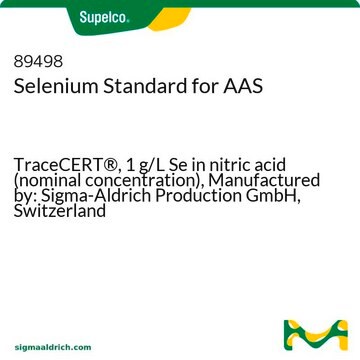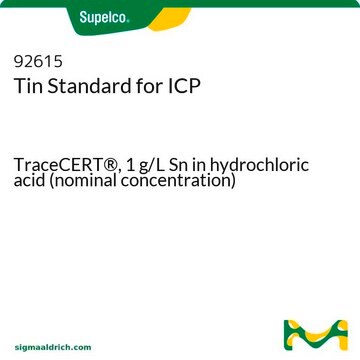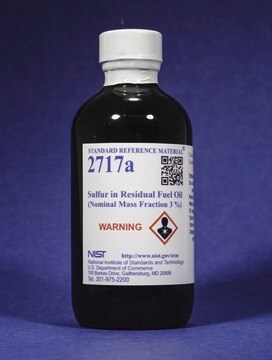30-2630
Tin standard solution
suitable for atomic absorption spectrometry, 1000 ppm Sn, 1 mg/mL Sn
Synonym(s):
Tin(II) chloride solution
About This Item
Recommended Products
form
liquid
availability
available only in Japan
concentration
1 mg/mL Sn
1000 ppm Sn
suitability
suitable for atomic absorption spectrometry
storage temp.
15-25°C
SMILES string
[Sn]
InChI
1S/Sn
InChI key
ATJFFYVFTNAWJD-UHFFFAOYSA-N
Looking for similar products? Visit Product Comparison Guide
Related Categories
Signal Word
Warning
Hazard Statements
Precautionary Statements
Hazard Classifications
Eye Irrit. 2 - Met. Corr. 1 - Skin Irrit. 2 - STOT SE 3
Target Organs
Respiratory system
Storage Class Code
8B - Non-combustible corrosive hazardous materials
WGK
WGK 1
Flash Point(F)
Not applicable
Flash Point(C)
Not applicable
Certificates of Analysis (COA)
Search for Certificates of Analysis (COA) by entering the products Lot/Batch Number. Lot and Batch Numbers can be found on a product’s label following the words ‘Lot’ or ‘Batch’.
Already Own This Product?
Find documentation for the products that you have recently purchased in the Document Library.
Our team of scientists has experience in all areas of research including Life Science, Material Science, Chemical Synthesis, Chromatography, Analytical and many others.
Contact Technical Service





